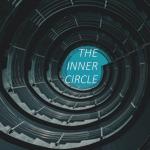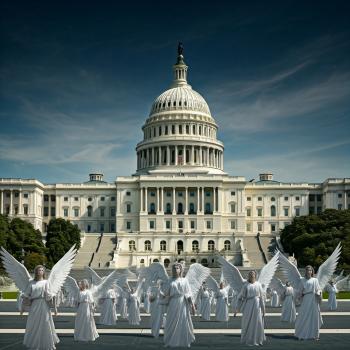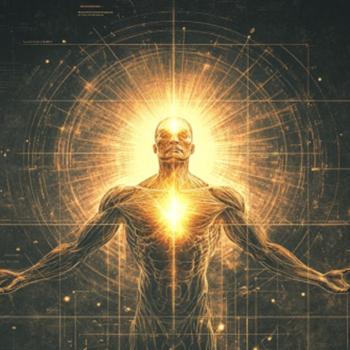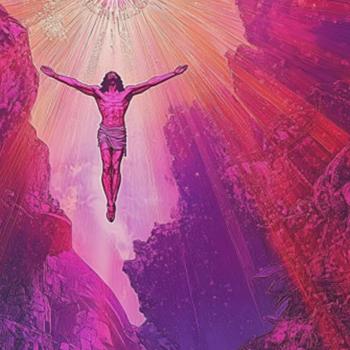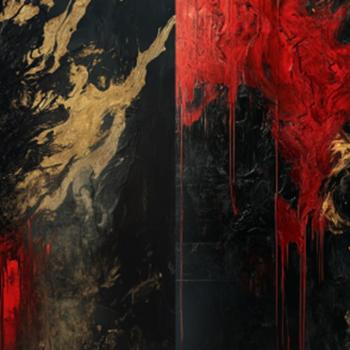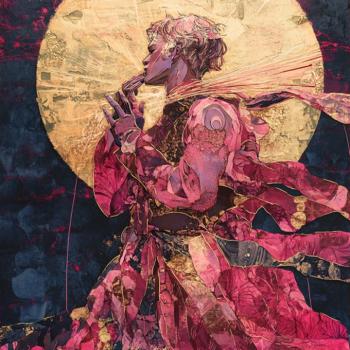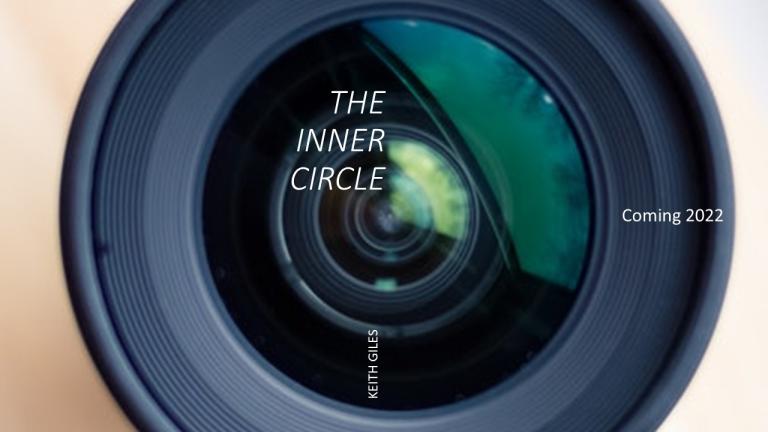
Saying 7: “Jesus said, “Blessed is the lion that becomes man when consumed by man; and cursed is the man whom the lion consumes, and the man becomes lion.”
We’ve already taken a look at this saying of Jesus back in our introduction for this series, but it’s worth revisiting it again here. Especially since it is such a pivotal saying in terms of helping us unlock the mystery of the meaning behind all the other sayings in the Gospel of Thomas.
If you remember, this otherwise incomprehensible beatitude is the one that uses Plato’s lion and beast metaphors for the ego to explain how the True Self – the man in this case – is either consumed by the ego or finds a way to overpower the ego to become the True Self.
In today’s Western world, the individual is seen as the greatest expression of humanity, and the concept of individuality is regarded as the most precious aspect of our selves to nurture, develop and protect.
Many of us find true meaning in the expression of our inner selves and tend to view the lack of individuality as being synonymous with oppression and subjugation.
To be fully alive, we might say, is to be self-reliant, self-confident, self-actualized and self-expressive. Anything less is not only unacceptable, it’s perhaps even a bit barbaric and backward thinking to most of us.
But, to be clear, this Ego-centric mindset is also completely immersed in the assumption of separation and division.
Is there a way for us to reconcile these seemingly contradictory notions as Oneness and the True Self without doing violence to individual freedom, self-expression and emotional fulfillment?
I believe the answer is “Yes,” but it might take a bit of redefining our assumptions about our True Self and the reality of Oneness that Jesus points us to in this saying.
The challenge we face is in understanding our True Self without the radical individuality of Ego getting in our way.
Of course, we would never want anyone to feel that their identity is dissolved by the realization of Oneness and Connectivity with Christ and every living thing in the Universe. On the contrary, our unique awareness and expression of the Christ within ourselves is necessary for the entirety of the Christ to become fully awakened. There is no Christ without the Christ in us. There is no “Hope of Glory” without the Christ in us coming alive…in us.
When we realize that we are not separate individuals that contain a piece of Christ within us, but that we are all the One Christ, this should expand and enlarge our sense of Self, not diminish it.
We are not tiny boxes that hold a small fragment of Christ inside. We are the fullness of Christ realized in every single Self; interwoven, interconnected, intertwined, and yet, still, altogether, ONE in Christ.
This is the great Mystery that Paul often talks about.
If we try to conceptualize our Oneness with Christ in this binary/dualistic way, as if Christ in us were like a series of Russian nesting dolls, we’ll quickly realize that this analogy falls apart immediately. Especially if we try to use that metaphor to understand statements where Jesus says, “On that day you will realize that I am in my Father, and you are in me, and I am in you.” [John 14:20]
It simply makes no sense to try to conceptualize Jesus inside the Father, and ourselves inside of Jesus while Jesus is inside of us in any physical sense. There’s no way to draw that picture on a piece of paper, or to put three objects inside one another at the same time.
This is why the only way to understand these concepts is to break outside of the physical reality and embrace a paradoxical reality where – somehow – everything can be inside everything else while everything else is inside of everything.
So, we need to start with the Non-Duality concept first if we ever hope to make sense of anything Jesus says in the Gospel of Thomas, or anywhere else.
Once we understand that our True Self is not a separate individual person, then and only then can we understand how becoming our True Self – which is in Christ as Christ is fully in everyone and everything – empowers us to truly find self-confidence, self-expression, self-reliance, and self-actualization in Christ [which is our True Self and everyone else’s True Self at the same time].
If your True Self is none other than the Christ who fills everything in every way, how could you fail to celebrate your own unique expression of the Christ in yourself? Or in others?
The saying of Jesus here reminds us that the Ego is a false expression of the self which operates in the illusion of separation. This Lion seeks to consume and devour the Man from within. Once this happens, the awareness of the True Self – which is One with Christ and with all things and all others – fades away.
What Jesus wants us to realize is that our identity is found only in the awareness that we are all filled with the fullness of Christ and that the Ego is a dangerous counterfeit reality that elevates the Self without understanding the truth about our inseparable connection to all things, everywhere.
Another way to read the saying of Jesus here in Thomas’s Gospel is this:
“Blessed is the Ego that becomes the True Self in Christ when consumed by the Christ…and cursed is the True Self whom the False Ego consumes.”
Either your Ego will overshadow your True Self, which is found only in Christ, or the Christ in you will consume your selfish, individualistic Ego. There are no other options.
Plato and Jesus
Earlier, we examined how this saying in particular helps us unlock the theme of Oneness and the illusion of Separation found in the sayings of Jesus within this Gospel of Thomas.
The main clue is the inclusion of a section from Plato’s Republic in the Nag Hammadi texts which specifically explained this saying as a contrast between the Man [True Self] and the Lion [Ego Self].
Whether or not Jesus actually knew of Plato’s metaphors prior to making this statement isn’t clear. We do know that his Republic was widely known in the First Century and anyone engaging in philosophical or metaphysical conversations around that time would certainly have had at least a passing knowledge of Plato’s ideas along these lines.
What we do know is that whoever hid those Nag Hammadi texts had more than a passing knowledge as evidenced by the inclusion of this exact section from the Republic alongside the Gospel of Thomas and other so-called “Gnostic” texts which echoed those ideas.
This saying does not specifically affirm non-duality or the illusion of separation, but what it does is give us an understanding of the internal struggle between our True Self and the False Self projected by our Ego.
However, once we begin to examine our own Ego self, we may notice that it thrives on the illusion of separation and duality. Ego exalts and promotes itself in contrast to others. Separation is an essential element of Ego consciousness. Or, to put it another way, Ego cannot survive in an environment of Oneness and Connection. Ego fights against such notions and denies any version of reality that requires the elevation of others to an equal status.
So, as Jesus says here, the Ego that becomes transformed by the True Self – “consumed by” the True Self – is blessed. But, the person whose True Self becomes consumed by the Ego is cursed.
Our choices are quite limited here. We either realize that our True Self is One with Christ and therefore with everyone and everything else in the Universe, or we continue to embrace the illusion of separation and feed our Ego’s delusion that we are the center of our own Universe.
One path leads to blessing. The other leads to a curse.
Either we accept the hidden teaching of Jesus that sets us free from this illusion, or we remain consumed by our own Ego and live separated – in our minds – from God and others.
Once the Lion of Ego is consumed by the True Self – which is Christ in us – we are set free from the illusion and our Ego becomes transformed into the blessed man who understands that Christ is all, and is in all. [Col. 3:11]
Once we realize that Christ is in the Father, and we are in Christ and Christ is in us [John 14:20], then we can begin to become the answer to Jesus’s prayer: “I pray that they will all be one, just as you and I are one—as you are in me, Father, and I am in you. And may they be in us so that the world will believe you sent me.” [John 17:2]
Once we are consumed by this realization, our inner transformation has only begun. But it is the transformation that remakes the World so that all things may become new again.
**
Keith Giles is the author of the 7-part best-selling “Jesus Un” book series from Quoir Publishing. His latest -and final book – in this series, Jesus Unarmed: How The Prince Of Peace Disarms Our Violence is available now. Keith is also the host of Second Cup with Keith [a new solo podcast available now on the Ethos Radio App, for Apple and Android and on Spotify; and the Heretic Happy Hour Podcast [along with co-hosts Matthew Distefano, Dr. Katy Valentine, and Derrick Day], and the new Apostate’s Anonymous podcast with Matthew Distefano.
He and his wife, Wendy, currently live in El Paso, TX.


